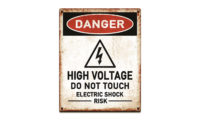Handling brownouts in your industrial facility

Regardless of your industry, it helps to be wary of brownouts that can hamper your productivity. Facility managers in all sectors should always consider brownouts a serious concern, as they can have multiple negative impacts on operations.
Brownouts explained
Certain events like high summer heat lead to increased energy consumption and cause electricity supply shortages. Brownouts happen when a power grid can’t keep up with the demand for electricity. This causes a temporary dip in voltage that results in a reduced supply of electricity to businesses and households. The power outage can last minutes, hours or days if not addressed promptly.
7 tips to handle brownouts
While brownouts occur randomly and there’s no way to predict when they’ll happen, there are steps you can take to safeguard your operations.
1. Have a backup generator ready
This is universal for all industries as it can help minimize losses from decreased productivity. A backup generator will let you keep critical operations functioning until the power turns on.
Standby generators are a great option because they automatically activate during power outages. They mean you’ll have a reliable power source that can deliver a continuous energy supply to machines and other equipment in your facility. This will be a wise investment in the long run, especially if you’re in an area with periodic power outages.
2. Do Regular generator maintenance
Having a backup generator on standby is one way to prepare for possible brownouts. Maintaining it is a whole topic altogether. Ensuring your generator works the way it should is an excellent way to ensure your facility gets a steady supply of power when a brownout hits.
Have certified professionals regularly check and service your standby generator to keep it in tip-top shape. The only thing worse than a brownout is having a standby generator that doesn’t work when you need it.
3. Use uninterrupted power supply units
Offices and facilities that rely heavily on computers and servers should consider uninterrupted power supply (UPS) units in their power outage plans. UPSs give your computers and other delicate electronic equipment short-term power backup for safe shutdown or data saving.
Having UPS systems in your facility will greatly reduce the risk of equipment damage and data loss, which leads to a loss in productivity and added repair costs. It’s a small adjustment that reaps great rewards in times of brownouts.
4. Use surge protectors for delicate electronic devices
Brownouts are a dip in voltage due to low power supply, leading to voltage fluctuations that can damage your equipment. Installing surge protectors is a good way to solve that problem. These devices shield your delicate electronics from damage arising from power surges.
The fluctuation caused by power surges leads to premature wear and tear of electronic devices. This little addition to your preparation will help keep your essential equipment safe from unnecessary damage.
5. Have an emergency plan in place
Whether it’s designating an individual to take care of your electrical system or assigning a safety officer in cases of emergency, you need to be one step ahead in your preparations. Safety protocols will safeguard your assets — including your employees and equipment — when power outages occur.
Devise an evacuation plan, stock up on emergency equipment and supplies like flashlights and first-aid kits, and designate an area for shelter-in-place situations. Train your employees on how to respond to emergencies and reduce the risk of accidents in the workplace.
Safety should be one of your top priorities in your facility. Get your bases covered and have contingency plans for all types of emergencies. It’s better to prepare ahead of time than panic during a brownout.
6. Install emergency lights in your facility
Stumbling in the dark can be a recipe for disaster. Safeguard your employees’ welfare during power outages by installing emergency lights in strategic locations. Light up hallways, stairwells, workspaces and so on to make it easy for your employees to navigate their way in the event of a blackout. Doing so could also help your staff waste less time getting back into their workflow.
7. Plan for emergency electrical repairs
Only some people know how to fix electrical problems at work or home. Having a dependable professional team to rely on during emergencies is essential if you plan to overcome any electrical issues.
Prepare for equipment failures, power outages, and everything else to keep your operations running smoothly and safely, even in times of emergency. Consider a 24/7 emergency electrical repair service for a wide range of problems. Remember — it’s better to have it and not need it than need it and not have it.
8. Being prepared matters
Power outages will come when you least expect them, so it’s better to prepare for when they do. Safeguarding your facility against power outages will guarantee your employees’ safety and continuous productivity to increase your bottom line.
Looking for a reprint of this article?
From high-res PDFs to custom plaques, order your copy today!








